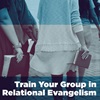Note: This article is excerpted from Deeper into the Word: New Testament.
Greek Origins
The Greek word allelon appears one hundred times in the New Testament. Most often, it is translated "one another" or "each other." It expresses the mutuality and community that is an inextricable part of our faith.
The New Testament exhorts us to care for one another, serve one another, admonish one another, bear with one another, submit to one another, encourage one another, pray for one another. All of these and the many other "one anothers" in the text are simply more specific ways to "love one another."
When we love one another, we benefit both others and ourselves. We experience community. In that fellowship, we experience God's love more fully.
Me or Us?
We live in a culture that highly values independence and autonomy. We can't change that, but if we are to understand the Bible, we must recognize that the Bible was written to a culture completely opposite of ours in this regard. When we read the Bible, we tend to read the word you as singular, as if God were giving us individual instructions for our separate, private, custom relationship with him. While individual practices are important, they are incomplete. If we focus only on our private practices of faith, we will misinterpret the text.
The word you in the Bible is most frequently plural. If we had a "revised Southern version," it would translate the pronoun as "y'all." In the Old English of the oldest Bible translations, the plural you was "ye." The singular was "thou." The unfortunate problem with not using such archaic language is we aren't sure whether you means thou or y'all. So we have to look at the context.
For example, 1 Corinthians 15:2 says, "By this gospel you are saved, if you hold firmly to the word I preached to you. Otherwise, you have believed in vain." If any verse touches our individualistic Western sensibilities, this is one.
But look at the context: the prior verse begins, "Now, brothers …" Other versions say "brothers and sisters" (TNIV, NLT) or "Friends" (MSG). In any case, the antecedent is plural. So Paul's instructions to hold firmly assume a context of community. And think of it—if you are a part of a fellowship that is exhorting one another, encouraging one another, praying for one another, and loving one another, doesn't that encourage each person to "hold firmly" to their faith with more strength and conviction than if they were each doing it in isolation? In our weak moments, if those around us are holding firmly, we're supported and held up.
This assumption of community did not begin with the apostle Paul. Jesus gathered a group of disciples whom he taught and lived with for three years. They did everything together. Just look, for example, at how Jesus taught his disciples to pray: "Give us this day our daily bread, forgive us our debts as we forgive … ." The text does not say "Give me this day my daily bread." The teachings of Jesus recognize that Christianity is a one another faith.
Paul's letters to the churches were read out loud to groups. Questions were posed, debated, discussed. They learned from one another. Each person may have thought and prayed individually after the discussion, but no one copied the text and took it home to study. They read and learned together.
While most world religions urge their followers to be charitable and kind to fellow human beings, Christianity elevates love of others as equally important to, and indeed an expression of, love for God himself. First John 4:12 says: "No one has ever seen God; but if we love one another, God lives in us and his love is made complete in us."
God calls us to love him by loving one another. In this way, perhaps Jesus' prayer, that we might be "one" just as he and the Father are one, would be answered.
—Excerpted from Deeper Into the Word: New Testament by Keri Wyatt Kent. Copyright 2011 by Bethany House Publishers. Used by permission. Unauthorized duplication prohibited.










